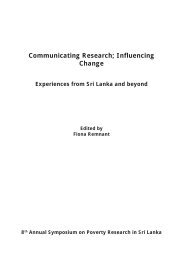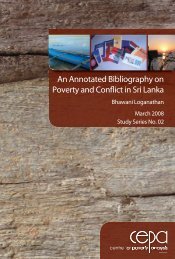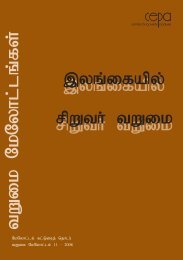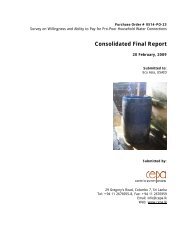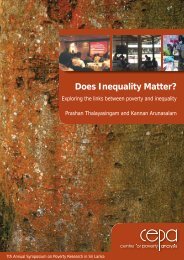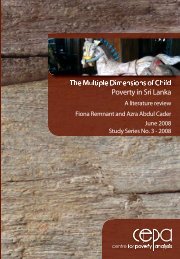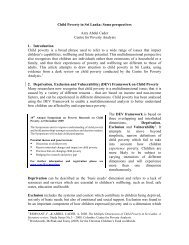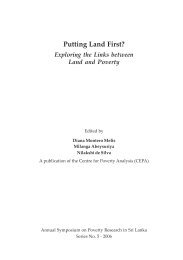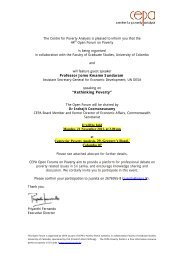Involuntary Displacement and Resettlement â Policy and ... - CEPA
Involuntary Displacement and Resettlement â Policy and ... - CEPA
Involuntary Displacement and Resettlement â Policy and ... - CEPA
- No tags were found...
You also want an ePaper? Increase the reach of your titles
YUMPU automatically turns print PDFs into web optimized ePapers that Google loves.
Social <strong>and</strong> Economic Impacts of <strong>Resettlement</strong> onTsunami Affected Coastal Fishery Households inSri LankaAsha Gunawardena 1 & Kanchana Wickramasinghe 2AbstractThe economy of the fisheries sector was devastated by the 2004 tsunami inSri Lanka, most particularly the coastal fisheries sector, the focus of thispaper. It examines the impact of post–tsunami policies related toresettlement, such as l<strong>and</strong> ownership <strong>and</strong> housing, <strong>and</strong> other resettlementdecisions made by fisher households <strong>and</strong> the government. The paper alsolooks at current issues facing resettled households <strong>and</strong> how they have beenaffected in terms of livelihood restoration, housing conditions, access toinfrastructure facilities <strong>and</strong> services, <strong>and</strong> access to social networks. Thepaper puts forward some policy options to minimize such issues.The study uses data from the Tsunami Census of the Department of Census<strong>and</strong> Statistics to underst<strong>and</strong> the pre-tsunami conditions of the fisherhouseholds. A follow-up survey was carried out in the six most tsunamiaffected districts in the Southern <strong>and</strong> Eastern provinces, in July 2008, toobtain data on the post-tsunami socio economic situation. In addition,1Asha Gunewardene is a Research Officer attached to the Environmental Economic <strong>Policy</strong>Unit of the Institute of <strong>Policy</strong> Studies (IPS) in Sri Lanka. She has researched <strong>and</strong> published onareas such as common property, natural resource management, coastal fishery management,poverty <strong>and</strong> distributional impacts of policies <strong>and</strong> development interventions in the l<strong>and</strong> sector<strong>and</strong> socio- economic aspects of tsunami affected households. Asha has an MBA from the Universityof Moratuwa on Technology Management <strong>and</strong> has received training from the World Bank,South Asian Network of Development <strong>and</strong> Environmental Economics (SANDEE) <strong>and</strong> CAPRInetwork of International Food <strong>Policy</strong> Research Institute (IFPRI).2 Kanchana Wickramasinghe is a Research Officer working at the Environmental Economic<strong>Policy</strong> Unit of the Institute of <strong>Policy</strong> Studies (IPS) of Sri Lanka. Her areas of interest includeenvironmental <strong>and</strong> natural resource economics <strong>and</strong> poverty. She holds a Master’s degree inEconomics from University of Colombo, <strong>and</strong> a post graduate diploma in ‘Universalizing SocioeconomicSecurity for the Poor’ from the Institute of Social Studies, The Hague, Netherl<strong>and</strong>s.She has co-authored IPS publications on “Disaster Management <strong>Policy</strong> <strong>and</strong> Practice: SharingLessons among Government, Civil Society & Private Sector” <strong>and</strong> “Post Tsunami Reconstruction<strong>and</strong> Rehabilitation: Household Views on Progress <strong>and</strong> Process”.83



